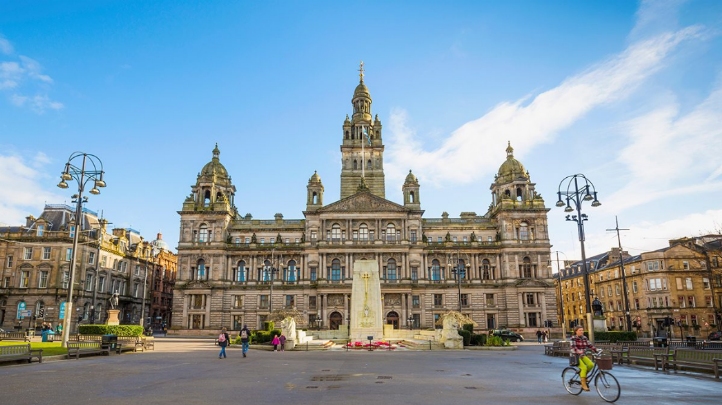Scottish Power has pledged to turn Glasgow into the UK’s first zero-carbon city with a mass rollout of electric vehicle (EV) charging points.

Scotland is aiming to reach net-zero by 2045, but Glasgow has unveiled plans to get there sooner
The company’s chief executive, Keith Anderson is due to outline the pledge in a speech at the All Energy Conference, which opens in Scotland’s biggest city today (15 May).
Scottish Power will work with Glasgow City Council on measures to decarbonise the city’s heating and transport.
One of the key measures will be installing an EV charging system over the next ten years to serve the 70+% of Glasgow’s residents who live in flats with no personal off-street parking.
Sites are already being assessed for workplace and public charging locations where these households can charge rapidly away from home.
Scottish Power has said it wants Glasgow to become a template for other cities across the UK facing similar problems.
Glasgow has already established the first low emission zone outside of London, and Scottish Power’s Whitelee onshore windfarm is located on the outskirts of the city.
Speaking at the All Energy Conference, Anderson is due to say: “We have a large supply of renewable energy on our doorstep and one of only two low emission zones in action across the UK. Now, we need to invest in the technologies and programmes that transform the rest of Glasgow’s economy and make us net zero before anyone else.
“It is our hope that this declaration kick-starts a race to zero with other ambitious cities, like Edinburgh, because then we will all be winners. The prize is the future of our country and our planet.”
Welcoming the announcement, Scottish first minister Nicola Sturgeon said: “Reaching our goals will need exactly this kind of partnership approach – with government, business, local authorities and citizens all playing their part.”
Beyond Glasgow, Anderson reiterated Scottish Power’s call to speed up the development of onshore wind across the country.
Pointing to the Committee on Climate Change’s (CCC) recent conclusion that low-carbon electricity generation must quadruple by 2050 in order for the UK to hit net zero emissions, Anderson said: “We can’t do this if we keep inventing ways to block new renewable capacity. Onshore wind, in particular, has suffered as a consequence and the time has come for a fundamental rethink.
“We’ve been able to compensate to some extent by racing ahead with large offshore wind projects, but quadrupling capacity can’t rely on putting all our eggs in one renewable basket. We’ve said very clearly we will aim to invest £6bn in renewable capacity by 2022. The easier it is to do this, the quicker we all get to net-zero.”
David Blackman
This article appeared first on edie’s sister title, Utility Week
